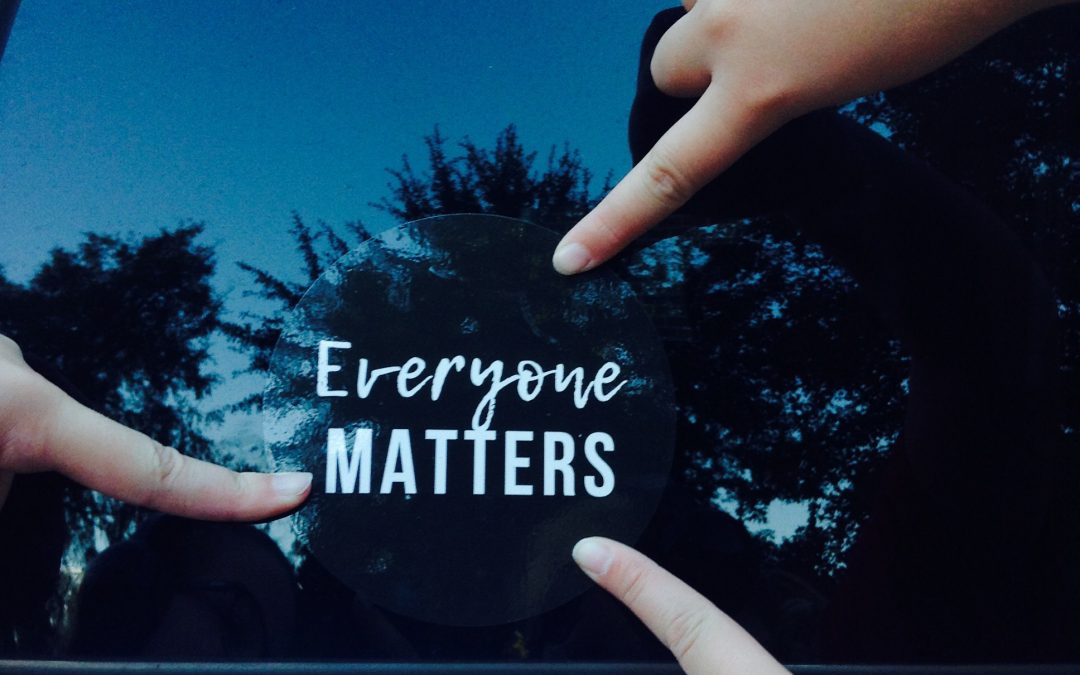Have you ever walked through a crowd of people, maybe in a mall, or downtown while shopping, or even at an event, and felt like no one even noticed that you were there? People avoided eye contact, and were either too occupied with the person they were with, or maybe on their phone, and they walked right past you without acknowledging you exist.
I remember that feeling well. I would walk down the street when I was a homeless kid, and see people look right through me, or a give me a glance of pity and then quickly look away. Sometimes I could see their face wrinkle up in response to how bad I smelled but they would try to hide it. Sometimes, they didn’t even try to hide it at all, and I could see them point and talk about me.
Those interactions are some of the most deeply imprinted memories of my time being homeless. The idea that I was either invisible, or even worse – disgusting to others. It stays with me every day. I don’t even know how to articulate how it felt to be invisible. I felt worthless and like my life was unimportant to the world. I felt like I didn’t matter at all.
For me, the holidays magnified many of these thoughts and hurts. When November rolled around, the “do I even matter” seemed to get worse. When you don’t have the same experiences of a “normal” person growing up – things like family, traditions, a stable household, extended relatives and holiday dinners and “every Thursday before Christmas, we go over to Uncle Rich’s house and suffer through a weird family potluck” kind of experience, you have a different kind of longing during the holidays. You may have fixed some of the outside things you were missing – maybe you now have your own family, or have your own house, or now have enough money to do and buy things, but on the inside, those things – like belonging, like knowing someone thinks you matter, like having somewhere to go – those things come back with a vengeance during the holidays. Especially for people who are homeless. All of the commercials and advertisements everywhere you turn are screaming the message of tradition and family and welcome home. That message tears at the wounds that are deep inside. Wounds that remind you that you don’t have a place to go – that you don’t belong anywhere. That you don’t matter. They make you feel invisible all over again. This causes a deep grief and pain that leads to bitterness and anger towards people who have never even realized what they have. It made me angry at my friends when they would complain about their family and how annoying family events were. It made me secretly sob when commercials would come on that reminded me of my childhood. It has made me overdo the holidays, trying to erase those feelings. And finally, it pushed me to try and help others so they don’t have to experience the same thing. It’s given me compassion for those whose pain I see and recognize, especially during Christmas time.
One night I was lying in bed, and I remember thinking that if only everyone knew that they mattered and then treated others that way, that so many of the problems of the world would be solvable. I wondered if others struggled with feeling like they didn’t matter or if it was just me. It was then that I felt this urgency to figure out how to convey the message that everyone matters. I wanted to put that message out there and have it spread far and wide because then maybe no one else would have to lie awake at night and wonder.
It seems like questioning if we matter gets a little more common in the month of December. Or maybe it’s just because we stretch ourselves so thin and go a little crazy trying to create some magical moment that we lose our ability to really connect with each other.
In a world where human connection is increasingly fragile, the holidays can feel like an expensive social experiment gone wrong. We create these forced, false environments where everything is supposed to be magical and beautiful and steeped in tradition, yet we are frantic and exhausted and tucking our true feelings about it all behind the couch with all the clean laundry that needs to be folded before company comes over. This time of year can leave you feeling disconnected from life. Magnifying feelings of inadequacy and loneliness, and leave you wondering why you don’t seem to have the same joy that everyone else has.
Spending the holidays with my homeless friends has always been a yin/yang experience for me. I acutely remember how painful the first Christmas I spent alone was. I remember being young enough that I still kind of wanted Santa and the hot chocolate and the stockings, yet trying hard to pretend that it was all annoying and I didn’t care. I spent the day in a shelter with a large group of people. We ate a “holiday” meal, but it was really just green beans, mashed potatoes and ham sandwiches on red plastic plates. There were attempts to make it festive, but the overall air in the room was one of anger, sadness and resignation. There was a forced joviality with the canned Christmas music playing and workers wearing cheap red Santa hats who weren’t any different than the day before. I would have preferred to pretend like the whole thing wasn’t even happening. Those experiences made me strongly dislike the holidays for a very long time. It was as if we couldn’t go off script and acknowledge this holiday thing we had created wasn’t made equal for everyone. I think of how everyone wants to help those in need during December and often wonder where those same people are in February when the cold and loneliness still linger.
Maybe instead of green bean casserole and cheap, red felt Santa hats, we should focus on just sitting and connecting with each other. Learning what happy traditions are for each other and celebrating those instead. Maybe you hate eggnog, but love strawberry milkshakes. Or maybe instead of ham and green beans, you love “brinner” (you know, breakfast for dinner). Or grilled cheese sandwiches. Or maybe you like heavy metal or bluegrass music instead of Christmas music. We should be celebrating whatever brings you comfort and joy and warm memories. Not the forced ideas of what the holidays are supposed to mean. That would actually be something nice to look forward to each year.
Creating human connection requires intentional thinking. It means going outside of the box, creating your own playbook for how you want to experience life. To forge deep, meaningful connections with one another, we have to spend the time. Listening, talking, sharing, laughing, crying, breaking bread together. It means making the mundane important. Sitting at a kitchen table while dishes are being done, or putting up the Christmas tree and a million ornaments together AFTER Christmas is over. It’s running errands with a friend so that you have the 20 minutes in the car together. It’s the time spent together on the thousands of little tasks that seem unimportant. When we spend this time together – when we strive to create intentional human connection – that’s when I think we experience the holy, sacred moments of life.
What I longed for the most when I was homeless was to just to be normal. To do the simple, basic things that we consider chores; the dishes after dinner, the rituals of getting ready for bed – not at a gas station sink, folding the laundry. I missed the background noise of being in a home – even when it was loud and chaotic.
I missed the human connection.
Whether its helping the homeless, serving the hungry a meal, or sitting with someone we know is struggling, I think the most important thing we can do is try and put ourselves in their shoes. Ask yourself, “What would matter most to me in this moment?” and then do that. Don’t overthink it. Don’t overanalyze it. Just do it. Show up and be present.
This is how we make sure that everyone matters. How everyone feels “seen”. How we spread the love that I believe God created us for to spread. This is how we keep someone from laying in bed at night wondering if they matter. Or sitting in a crowded church service wondering if anybody cares that they exist. We SEE each other. Whether they are homeless and dirty or hungry and ashamed to be eating at a community meal, or sitting at the dining room table alone in a beautiful, custom built home surrounded by nice things, we take the time to look for them and SEE them where they are.
Once you start letting the invisible become visible, you see things differently. I often say that once you know homeless people exist you can never “un-see” them. This is true of each other. Once we “see” the humanity in each other – our pain, our hurt, our joy – our real selves, then we can’t un-see that. And maybe you even recognize some of it. And you carry that knowledge around with you forever.
You then have two choices: You can continue to serve them green beans with cheap, red felt Santa hats and pretend like that’s what they want OR you can sit down and figure out what actually brings the joy and peace to them that we want the holidays to bring. We can begin the journey of creating intentional connection with each other and not only add meaning to the holidays, but maybe even find our way back to each other and begin to heal some of our wounds.
If we keep doing that twelve months a year instead of only 25 days in December, it will take us all the way home.
– Krista Manchester

